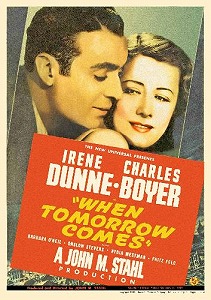| When Tomorrow Comes | |
|---|---|
 | |
| Directed by | John M. Stahl |
| Screenplay by | Dwight Taylor |
| Story by | "A Modern Cinderella" by James M. Cain |
| Produced by | John M. Stahl |
| Starring | |
| Cinematography | John J. Mescall |
| Edited by | Milton Carruth |
Production company | Universal Pictures |
| Distributed by | Universal Pictures |
Release date |
|
Running time | 90 minutes |
| Country | United States |
| Language | English |
| Budget | $1 million[1][2] |
When Tomorrow Comes is a 1939 American romantic drama directed by John M. Stahl, and starring Irene Dunne and Charles Boyer. The screenplay concerns a waitress who falls in love with a man who later turns out to be a married concert pianist. Bernard B. Brown won the Academy Award for Best Sound.[3]
A scene in the film where the two protagonists take refuge from a storm in a church was the subject of Cain v. Universal Pictures, a case in which the writer James M. Cain sued Universal Pictures, the scriptwriter and the director for copyright infringement. Judge Leon Rene Yankwich ruled that there was no resemblance between the scenes in the book and the film other than incidental "scènes à faire", or natural similarities due to the situation, establishing an important legal precedent.[4]
- ^ "1939 Hollywood Toppers". Variety. January 3, 1940. p. 28.
- ^ Dick, Bernard K. (2015). City of Dreams: The Making and Remaking of Universal Pictures. University Press of Kentucky. p. 116. ISBN 9780813158891.
- ^ "The 12th Academy Awards (1940) Nominees and Winners". oscars.org. Retrieved August 11, 2011.
- ^ Yankwich, Leon Rene (December 14, 1942). "CAIN v. UNIVERSAL PICTURES CO., Inc., et al". District Court, S. D. California, Central Division. Retrieved June 20, 2012.